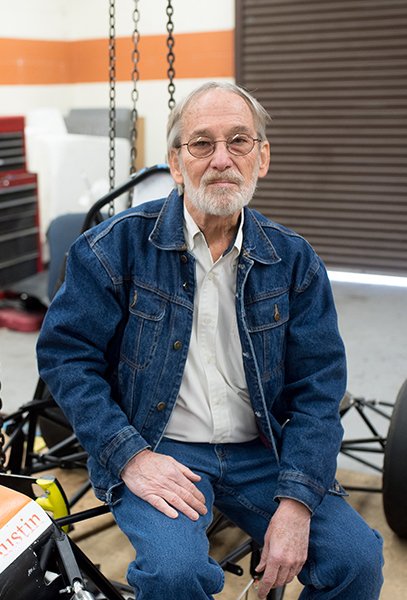Mechanical Engineering Hall of Fame, 2022
B.S., Mechanical Engineering, The University of Texas at Austin, 1971
M.S., Mechanical Engineering, The University of California, Berkeley, 1972
Ph.D., Mechanical Engineering, The University of California, Berkeley, 1977
Ron Matthews got his BSME from The University of Texas at Austin followed by three graduate degrees from the University of California, Berkeley. He joined the mechanical engineering faculty at UT Austin in January 1980 and immediately founded the UT Austin student branch of the Society of Automotive Engineers (SAE).
The following academic year, he founded, named, and hosted what became the largest intercollegiate student engineering design competition in the world. “Formula SAE” now has more than 650 teams from 50 countries and competitions are held in Japan, Australia, Brazil, Italy, Austria, Germany, England, and two in the U.S. each year. Most notable among his research accomplishments was leading the team that discovered the reason that direct injection spark ignition engines could not meet U.S. emissions standards. These are the most fuel-efficient gasoline engines and are now installed in more than 55% of all light-duty vehicles produced in the U.S.
He has been very active in service to SAE-International, serving on numerous committees and boards, including serving on the Board of Directors from 2009-2011. He is a Fellow of the SAE and has won multiple awards from the SAE including the Arch T. Colwell Merit Award for his work on the first use of fractal geometry to model the combustion process within a spark ignition engine. UT Austin’s body of work on fractal engine modeling was selected for inclusion in the Smithsonian's National Museum of American History Permanent Research Collection on Information, Technology, and Society. He also won the ASME Internal Combustion Engines Award. He has been a consultant to the National Academy of Sciences, Lockheed Missiles and Space Company, the National Institute of Standards and Technology, General Motors Corporation, Argonne National Laboratory, and many other government agencies and private companies, primarily in the engines area. He has served as an expert witness for the Office of the Attorney General of the State of Texas and for the U.S. Department of Justice. Most notably, he served as an expert witness for the U.S. Department of Justice (on behalf of the Environmental Protection Agency) versus Volkswagen (2015) and again versus Fiat Chrysler America (2019), in similar Diesel emissions treating scandals.







